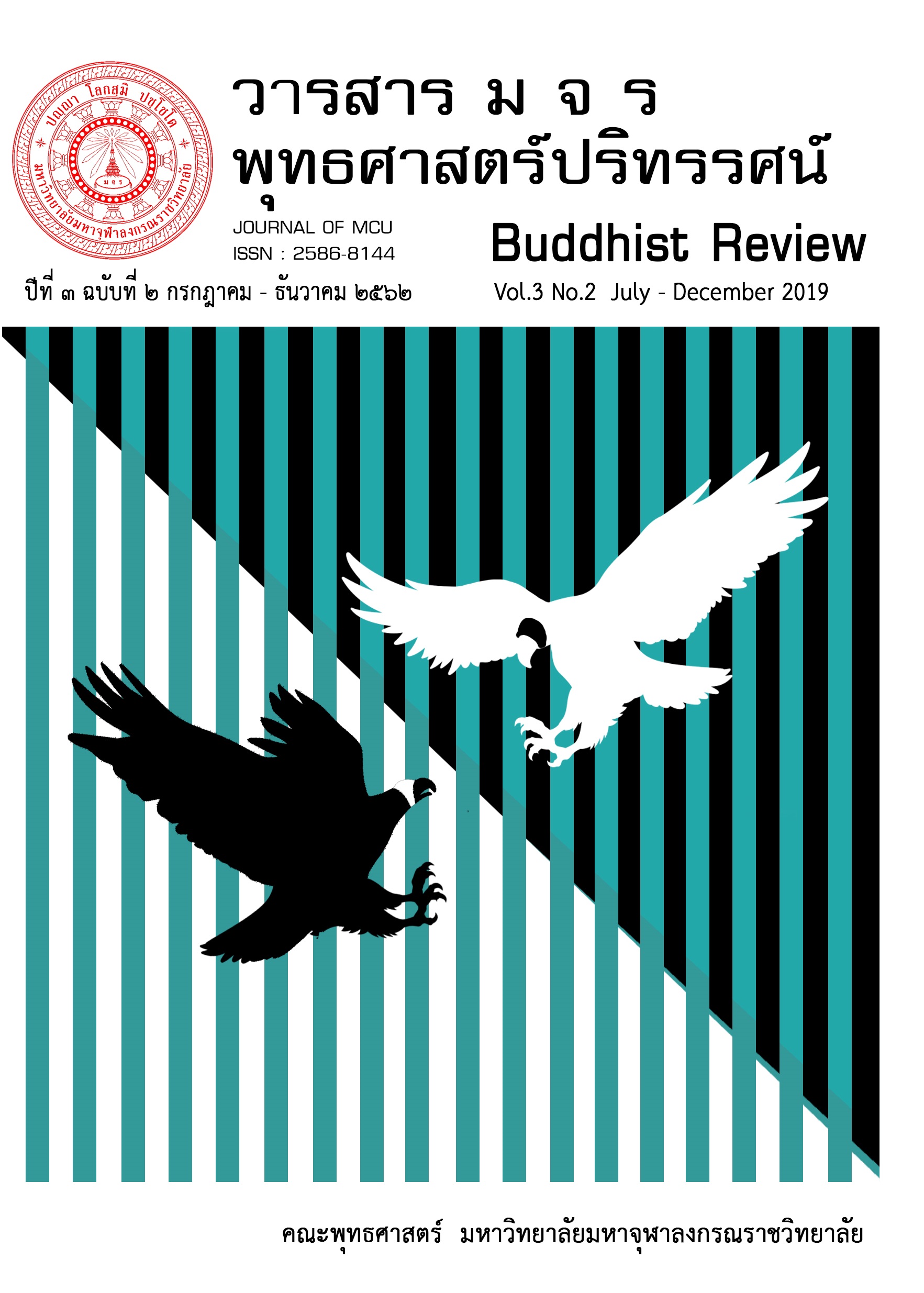แนวคิดเรื่องวิญญาณเชิงพุทธปรัชญา
Main Article Content
บทคัดย่อ
บทความวิชาการนี้ มีจุดประสงค์เพื่อศึกษาเรื่องวิญญาณในคัมภีร์พระไตรปิฎก แล้วทำการวิเคราะห์แนวคิดเรื่องวิญญาณในเชิงพุทธปรัชญา จากผลการศึกษาวิเคราะห์พบว่า ตามแนวคิดของพุทธปรัชญา มนุษย์ประกอบด้วยขันธ์ ๕ รูป เวทนา สัญญา สังขาร วิญญาณ วิญญาณเป็นส่วนประกอบที่สำคัญของชีวิตมนุษย์ ถ้าขาดวิญญาณชีวิตมนุษย์ก็ดับ และชีวิตมนุษย์จะเกิดได้ก็ต้องมีวิญญาณมาปฏิสนธิ วิญญาณนอกจากเป็นความรับรู้อารมณ์จากทางทวารทั้ง ๖ อันได้แก่ ตา หู จมูก ลิ้น กาย และใจ จากการได้สัมผัสรูป เสียง กลิ่น รส สัมผัส และธรรมารมณ์แล้วยังหมายความถึงจิต ที่อยู่ในกาย คนจะดีหรือชั่วอยู่ที่จิตเป็นสำคัญ ซึ่งเมื่อกายนี้แตกดับไปแล้ว ภวังคจิตจะออกจากร่างไปสู่ภพภูมิใหม่ด้วย วิญญาณเป็นสิ่งที่สำคัญสิ่งหนึ่งในห่วงโซ่ที่ทำให้เกิดสังสารวัฏ ทำให้เกิดชรา มรณะ โสกะ ปริเทวะ ทุกข์ โทมนัส และอุปายาส ซึ่งมีต้นเหตุมาจากอวิชชา วิญญาณเกิดขึ้นมาเพราะสังขาร หากสังขารดับ วิญญาณย่อมดับ ซึ่งจะเป็นผลให้เกิดความดับแห่งกองทุกข์ทั้งมวล
Article Details
- บทความที่ได้รับการตีพิมพ์เป็นลิขสิทธิ์ของวารสาร มจร พุทธศาสตร์ปริทรรศน์
- ข้อความใดๆ ที่ปรากฎในบทความที่ได้รับการตีพิมพ์ในวารสาร ถือเป็นความรับผิดชอบของผู้เขียนบทความ และข้อคิดเห็นนั้นไม่ถือว่าเป็นทัศนะและความรับผิดชอบของกองบรรณาธิการวารสาร มจร พุทธศาสตร์ปริทรรศน์
เอกสารอ้างอิง
มหาจุฬาลงกรณราชวิทยาลัย. พระไตรปิฎกภาษาไทย ฉบับมหาจุฬาลงกรณราชวิทยาลัย. กรุงเทพ มหานคร: โรงพิมพ์มหาจุฬาลงกรณราชวิทยาลัย, ๒๕๓๙.
บรรจบ บรรณรุจิ, ผศ.ร.ท.ดร.. จิต มโน วิญญาณ พื้นฐานของชีวิตและการเรียนรู้. พิมพ์ครั้งที่ ๔. กรุงเทพมหานคร: โรงพิมพ์มหาจุฬาลงกรณราชวิทยาลัย, ๒๕๓๖.
พร รัตนสุวรรณ. พุทธวิทยา เล่ม ๑. กรุงเทพมหานคร: โรงพิมพ์ประยูรวงศ์, ๒๔๙๙.
พระพรหมคุณาภรณ์ (ป.อ. ปยุตฺโต). พุทธธรรม ฉบับปรับขยาย. พิมพ์ครั้งที่ ๔๑. กรุงเทพมหานคร: สำนักพิมพ์ผลิธรรม ในเครือ บริษัท สำนักพิมพ์เพ็ทแอนด์โฮม จำกัด, ๒๕๕๘.
ราชบัณฑิตสถาน. พจนานุกรมฉบับราชบัณฑิตสถาน พ.ศ. ๒๕๕๔. พิมพ์ครั้งที่ ๒. กรุงเทพมหานคร: บริษัทนานมีบุ๊คส์พับลิเคชั่นส์ จำกัด, ๒๕๕๖.
วิทย์ วิศทเวทย์, ศาสตราจารย์กิตติคุณ ดร.. ปรัชญาทรรศน์: พุทธปรัชญา. กรุงเทพมหานคร: โรงพิมพ์แห่งจุฬาลงกรณ์มหาวิทยาลัย, ๒๕๕๓.
สมภาร พรมทา, ศาสตราจารย์ ดร.. ความคิดพื้นฐานทางปรัชญาที่สำคัญของพระพุทธเจ้า. กรุงเทพมหานคร: โรงพิมพ์แห่งจุฬาลงกรณ์มหาวิทยาลัย, ๒๕๕๖.
สุนทร รังษี, ศาสตราจารย์พิเศษ ดร.. พุทธปรัชญาจากพระไตรปิฎก. พิมพ์ครั้งที่ ๓. กรุงเทพมหานคร: โรงพิมพ์แห่งจุฬาลงกรณ์มหาวิทยาลัย, ๒๕๕๐.
John Locke. An Essay Concerning Human Understanding. [ออนไลน์]. แหล่งที่มา: https://en.wikipedia.org/wiki/An_Essay_Concerning_Human_Understanding [๗ กันยายน ๒๕๖๒].


